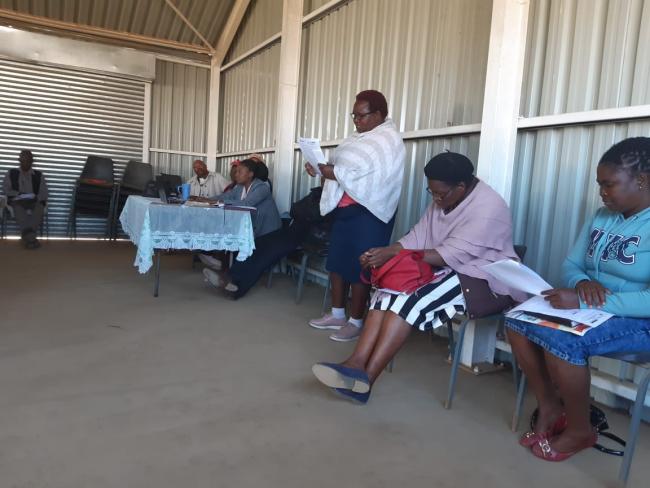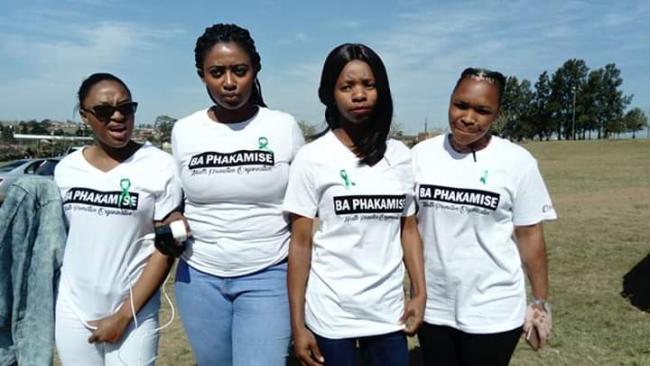The Rural Health Advocacy Project (RHAP) is working with community and health care facility (HCF) leaders to address the systemic issues around WASH in South Africa.
Published on: 02/10/2019
This blog is written by Karessa Govender of RHAP
South Africa provides a perfect example of how statistics do not always give a complete picture. While 88.6% of South Africans have access to piped water that figure hides a large rural-urban divide on access to water, sanitation and hygiene (WASH) facilities in rural communities and homes. For contrast to the above national figure, only 26.5% of residents in the rural Nyandeni sub-district have access to piped water. Access to sanitation is far worse with only 6.2% of the population accessing flushed or chemical toilets and 27.2% having no access to any toilet.
It is in this sub-district where the Rural Health Advocacy Project (RHAP) is working with community and health care facility (HCF) leaders to address the systemic issues around WASH in HCFs. However, for this community, access to WASH in homes and WASH in health care facilities are inseparable. As actors within the health rights space, RHAP and their local partners are forced to consider how they determine key advocacy issues and to what extent these issues reflect the core issues of the communities they are advocating with and for.

This theme was raised during a recent workshop where community members expressed their challenges with accessing adequate water and sanitation services in their households. While they appreciated the health impact of poor WASH in HCF, their greater need is WASH in their daily lives. This is understandable and not to be ignored going forward with advocacy work. There needs to be a concerted effort to intertwine both issues: WASH at household and community level with WASH in HCFs. Expanding the project to include household WASH access will require a redesign of RHAP’s current approach, investing time in understanding a different system whilst ensuring the original objectives of the WASH in HCF project are achieved. Despite the challenges a broader advocacy goal brings, this new approach will yield better results because it meets the community where they are. This, in addition to broadening their understanding of the health system, the impact of WASH on the health system’s ability to provide adequate health services and how this directly affects the health of residents and communities.
The problem of inadequate WASH services in Nyandeni is not isolated to just WASH. It is a symptom of a dysfunctional health system with underlying issues of poor governance, oversight and a lack of an informed and engaged community that can hold the state to account when faced with inadequate services. From the onset, it was crucial for RHAP this project should go beyond documenting the state of WASH in rural HCFs. Piecemeal interventions that focus on only one part of the problem does very little to remediate broader systemic issues.

To address these larger systemic issues, RHAP has partnered with the local NGO Ba Phakamise with broader experience within the Nyandeni community. It was important that whilst investigating the state of WASH in HCFs we equip community members on how to advocate for themselves when faced with future health systems crises, including lack of WASH access in HCF, even if that means individual activities take longer to get off the ground. RHAP is educating communities of Nyandeni on their health rights and entitlements, in health system overviews and governance, and with basic advocacy skills. We are not simply empowering rural communities to tackle inadequate WASH in HCFs but future health systems’ issues they will encounter in the future.
During one of the recent imbizo several participants said ‘Enkosi, sisi’ to Ba Phakamise representatives. Loosely translated this means ‘Thank you, sister’ in IsiXhosa, the language spoken locally within the community of Nyandeni. While a simple phrase, beneath it lies an acknowledgement and gratitude of seeing rural communities as capable of taking ownership of the changes they want in the health system. And that ultimately, by investing in rural people, we are making investments in rural health.
At IRC we have strong opinions and we value honest and frank discussion, so you won't be surprised to hear that not all the opinions on this site represent our official policy.